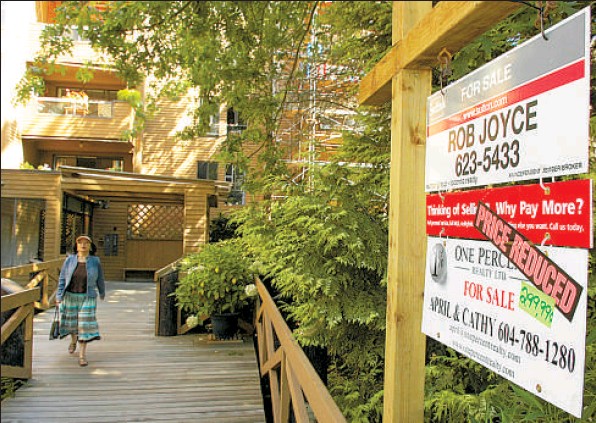Victoria, Kelowna prices hit hardest by this year’s market decline
Province

Signs, such as this one from August, 2006, offering real-estate price reductions may be returning to Vancouver as home sales stay flat in 2009
Victoria and Montreal will share the dubious honour of posting the sharpest decline in home sales next year, at 11 per cent, a national real-estate firm predicts.
Victoria and Kelowna will share another dark honour as the two B.C. cities post the nation’s steepest drop in average home prices in 2009, at 10 per cent, Re/Max said in a forecast released yesterday.
As for Vancouver, sales will plunge by 33 per cent this year but stay flat at 26,000 in 2009, Re/Max said.
Average home prices in Greater Vancouver are expected to rise two per cent this year to $585,000 and fall by one per cent to $580,000 in 2009, the real-estate company said.
For Canada as a whole, home sales are expected to stabilize in 2009 after a double-digit drop this year, while prices will edge down slightly following this year’s single-digit decline.
“Nationally, 440,000 homes are expected to change hands in 2008, down 15 per cent from record 2007 levels,” Re/Max said.
“Canadian housing values are expected to hover at $300,000, a nominal three per cent decline from last year’s historic peak.”
Sales are expected to drop further in the early part of 2009 before recovering by the end of the year at the 440,000 level, Re/Max said.
The average price is expected to slip by two per cent to an average of $293,000, it said.
“Global economic uncertainty weighed heavily on residential real-estate activity in most major Canadian centres during the latter half of 2008,” it said. “Although the forecast for 2009 promises more of the same, most markets are expected to weather the storm.” And average prices have held up “remarkably well” across the country despite what were double-digit declines in 13 of 22 markets, thanks to solid gains early in the year, it said.
The outlook is for “somewhat static” activity in the first six to nine months of 2009, given continued volatility in financial markets and the threat of recession. However, as stability returns to the financial sector, housing markets are expected to recover.
“The landscape is definitely changing — with most markets shifting into either balanced or buyer’s territory,” said Elton Ash, Re/Max’s regional executive vice-president for Western Canada. “Sellers no longer rule the roost.
“Opportunities exist for purchasers like never before, including lower interest rates, greater inventory levels, the luxury of time to make decisions, and the upper-hand at the negotiating table,” he said, adding that sellers now need to take that into account in setting their asking prices.
Still, of the 22 major markets in Canada, half are expected to see home sales in 2009 match or exceed this year’s levels.
The relatively upbeat forecast was seen as evidence of the relative strength of the domestic housing market.
“News that house prices are in decline in Canada should not come as a surprise to anyone,” said Mark Frey, vice-president foreign exchange at CustomHouse, an international payments firm. “Instead, the simple fact that the declines come via a low, single-digit figure perhaps should.
“Certainly, this report should serve as yet another example of how the underlying fundamentals of the Canadian economy remain comparatively sound, especially compared to much of the industrialized world as plunging real-estate values from San Francisco to London to Barcelona and Auckland lead the world economy further into the abyss.”
And that resilience should, in turn, help support the domestic side of the Canadian economy, Frey added.
“While it may not be enough to avoid a recession outright, it should translate into a shallow and less prolonged downturn than what is being experienced elsewhere,” he said.
© Copyright (c) The Province
